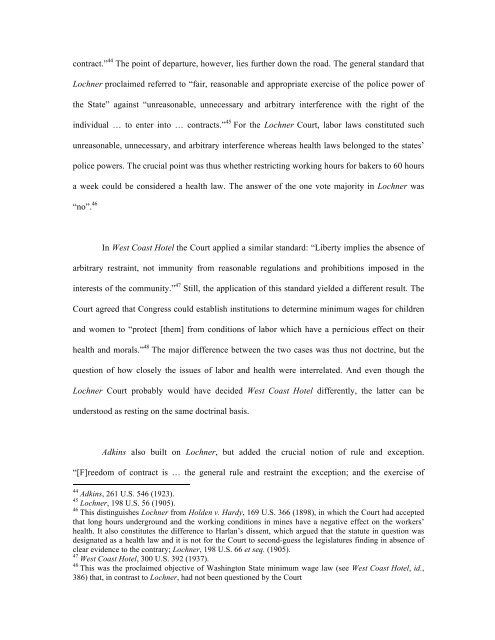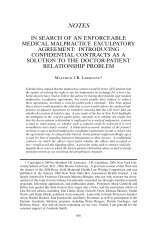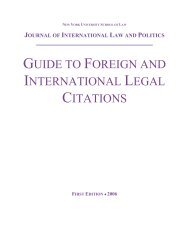Jasper Finke, Crisis and Law - New York University School of Law
Jasper Finke, Crisis and Law - New York University School of Law
Jasper Finke, Crisis and Law - New York University School of Law
Create successful ePaper yourself
Turn your PDF publications into a flip-book with our unique Google optimized e-Paper software.
contract.” 44 The point <strong>of</strong> departure, however, lies further down the road. The general st<strong>and</strong>ard that<br />
Lochner proclaimed referred to “fair, reasonable <strong>and</strong> appropriate exercise <strong>of</strong> the police power <strong>of</strong><br />
the State” against “unreasonable, unnecessary <strong>and</strong> arbitrary interference with the right <strong>of</strong> the<br />
individual … to enter into … contracts.” 45 For the Lochner Court, labor laws constituted such<br />
unreasonable, unnecessary, <strong>and</strong> arbitrary interference whereas health laws belonged to the states’<br />
police powers. The crucial point was thus whether restricting working hours for bakers to 60 hours<br />
a week could be considered a health law. The answer <strong>of</strong> the one vote majority in Lochner was<br />
“no”. 46<br />
In West Coast Hotel the Court applied a similar st<strong>and</strong>ard: “Liberty implies the absence <strong>of</strong><br />
arbitrary restraint, not immunity from reasonable regulations <strong>and</strong> prohibitions imposed in the<br />
interests <strong>of</strong> the community.” 47 Still, the application <strong>of</strong> this st<strong>and</strong>ard yielded a different result. The<br />
Court agreed that Congress could establish institutions to determine minimum wages for children<br />
<strong>and</strong> women to “protect [them] from conditions <strong>of</strong> labor which have a pernicious effect on their<br />
health <strong>and</strong> morals.” 48 The major difference between the two cases was thus not doctrine, but the<br />
question <strong>of</strong> how closely the issues <strong>of</strong> labor <strong>and</strong> health were interrelated. And even though the<br />
Lochner Court probably would have decided West Coast Hotel differently, the latter can be<br />
understood as resting on the same doctrinal basis.<br />
Adkins also built on Lochner, but added the crucial notion <strong>of</strong> rule <strong>and</strong> exception.<br />
“[F]reedom <strong>of</strong> contract is … the general rule <strong>and</strong> restraint the exception; <strong>and</strong> the exercise <strong>of</strong><br />
44 Adkins, 261 U.S. 546 (1923).<br />
45 Lochner, 198 U.S. 56 (1905).<br />
46 This distinguishes Lochner from Holden v. Hardy, 169 U.S. 366 (1898), in which the Court had accepted<br />
that long hours underground <strong>and</strong> the working conditions in mines have a negative effect on the workers’<br />
health. It also constitutes the difference to Harlan’s dissent, which argued that the statute in question was<br />
designated as a health law <strong>and</strong> it is not for the Court to second-guess the legislatures finding in absence <strong>of</strong><br />
clear evidence to the contrary; Lochner, 198 U.S. 66 et seq. (1905).<br />
47 West Coast Hotel, 300 U.S. 392 (1937).<br />
48 This was the proclaimed objective <strong>of</strong> Washington State minimum wage law (see West Coast Hotel, id.,<br />
386) that, in contrast to Lochner, had not been questioned by the Court
















